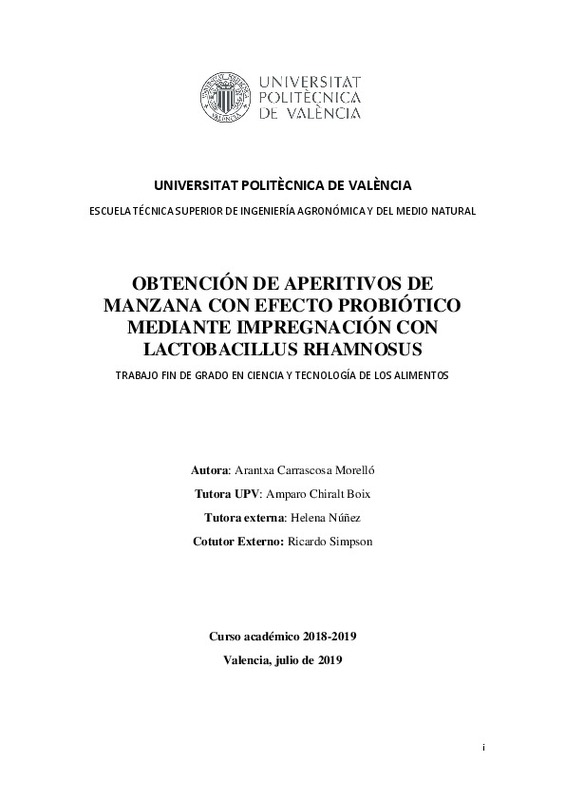|
Resumen:
|
[ES] Las frutas y las verduras son alimentos que juegan un papel fundamental en una dieta saludable. En primer lugar por su gran aporte de vitaminas y minerales; y, en segundo lugar porque contienen gran cantidad de agua, ...[+]
[ES] Las frutas y las verduras son alimentos que juegan un papel fundamental en una dieta saludable. En primer lugar por su gran aporte de vitaminas y minerales; y, en segundo lugar porque contienen gran cantidad de agua, fibra y antioxidantes naturales. Por este motivo, la Organización Mundial de la Salud (OMS) recomienda un consumo mínimo de 400 g diarios de estos alimentos. Sin embargo, se estima que solo el 15% de la población consume 5 o más porciones de fruta y verdura al día, como es recomendado.
Para hacer frente al bajo consumo de este tipo de alimentos, se ha decidido desarrollar un snack saludable de manzana para ser consumido como aperitivo a cualquier hora del día. Además, dado que el snack está impregnado con Lactobacillus Rhamnosus, este aperitivo puede contribuir a prevenir o tratar diversas enfermedades gastrointestinales, dado los efectos beneficiosos para la salud de los probióticos.
Con el objetivo de obtener los snacks, se cortaron discos de manzana y se impregnaron con una solución de agua peptonada con L. Rhamnosus. La impregnación se llevó a cabo por inmersión en el cultivo de las muestras con y sin aplicación previa de perforación láser, para fomentar la porosidad y la incorporación de microorganismos, y con y sin aplicación de vacío en el proceso de inmersión. Posteriormente, las muestras se secaron para obtener los snacks, con una actividad de agua inferior a 0,4 y una humedad inferior al 12%, mediante tres métodos: secado convencional con aire caliente, secado convencional a vacío y secado en ventana refractiva, los dos primeros a 45ºC y el último a 70ºC.
Los recuentos de microorganismos obtenidos en las muestras impregnadas antes del secado no reflejaron diferencias significativas debidas a los distintos pretratamientos, con lo que ni la microperforación ni la impregnación a vacío mejoraron sensiblemente la carga en probióticos del producto (5,2x108 UFC/g de sólidos del producto). La comparación de los tres tipos de secado reflejó una mejor preservación de la carga total de microorganismos en el secado convencional con aire caliente (2,6x107 UFC/g de sólidos del producto).
[-]
[EN] Fruits and vegetables are foods that play a fundamental role in a healthy diet. First because of its great contribution of vitamins and minerals; and, secondly because they contain a large amount of water, fiber and ...[+]
[EN] Fruits and vegetables are foods that play a fundamental role in a healthy diet. First because of its great contribution of vitamins and minerals; and, secondly because they contain a large amount of water, fiber and natural antioxidants. For this reason, the World Health Organization (WHO) recommends a minimum consumption of 400 g per day of these foods. However, it is estimated that only 15% of the population consumes 5 or more pieces of fruit and vegetables per day, as recommended.
To cope with the low consumption of this type of food, it has been decided to develop a healthy apple snack to be consumed as an appetizer at any time of the day. In addition, since the snack is impregnated with Lactobacillus Rhamnosus, this snack can help us prevent or treat various gastrointestinal diseases, given the beneficial health effects of probiotics.
In order to obtain the snacks, apple discs were cut and impregnated with a peptonade water solution containing L. Rhamnosus. The impregnation was carried out by immersion in the culture of the samples with and without prior application of laser drilling, to promote porosity and the incorporation of microorganisms, and with and without application of vacuum in the immersion process. Subsequently, the samples were dried to obtain the snacks, with a water activity of less than 0,4 and humidity of less than 12%, by three methods: conventional drying with hot air, conventional drying under vacuum and drying in a refractive window, the first two at 45ºC and the last at 70ºC.
The counts of microorganisms obtained in the samples impregnated before drying did not reflect significant differences due to the different pretreatments, so that neither microperforation nor vacuum impregnation significantly improved the probiotic load of the product (5,2x108 CFU/g solids of the product). The comparison of the three types of drying reflected a better preservation of the total microorganism load in conventional drying with hot air (2,6x107 CFU/g of product solids).
[-]
|







